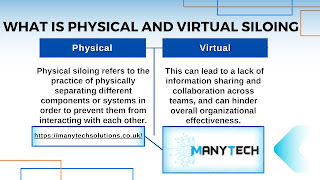What Is Physical and Virtual Siloing?
Physical
siloing refers to the practice of physically separating different components or
systems in order to prevent them from interacting with each other.
Seo Service In the context of computer security, physical siloing
may involve physically isolating sensitive or critical systems from other
systems that are less secure or less critical.
This can be done through measures such as
air-gapping, which involves physically disconnecting a computer or network from
the internet or other networks to prevent unauthorized access.
Physical
siloing can be an effective way to reduce the risk of unauthorized access or
data breaches, particularly in situations where the data or systems involved
are extremely sensitive or valuable.
However, it
can also be expensive and time-consuming to implement, and may not always be
practical or necessary depending on the specific security requirements of a
given organization or system.
Virtual
Virtual
siloing refers to the practice of separating different teams or departments
within an organization into isolated virtual spaces, often using technology
such as separate communication channels or collaboration tools.
This can lead to a lack of information sharing
and collaboration across teams, and can hinder overall organizational
effectiveness.
Virtual siloing can occur in remote or
distributed work environments where employees may not have the opportunity to
interact with each other regularly.
It is
important for organizations to actively promote cross-functional collaboration
and communication to avoid the negative effects of virtual siloing.




Comments
Post a Comment